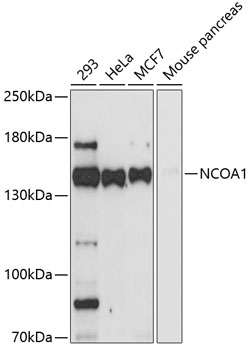-
Product Name
NCOA1 Polyclonal Antibody
- Documents
-
Description
Polyclonal antibody to NCOA1
-
Tested applications
WB
-
Species reactivity
Human, Mouse
-
Alternative names
NCOA1 antibody; F-SRC-1 antibody; KAT13A antibody; RIP160 antibody; SRC1 antibody; bHLHe42 antibody; bHLHe74 antibody; nuclear receptor coactivator 1 antibody
-
Isotype
Rabbit IgG
-
Preparation
Antigen: A synthetic peptide of human NCOA1
-
Clonality
Polyclonal
-
Formulation
PBS with 0.02% sodium azide, pH7.3.
-
Storage instructions
Store at 4℃. Avoid freeze / thaw cycles.
-
Applications
WB 1:500 - 1:1000
-
Validations

Western blot - NCOA1 Polyclonal Antibody
Western blot analysis of extracts of various cell lines, using NCOA1 antibody at 1:1000 dilution.Secondary antibody: HRP Goat Anti-Rabbit IgG (H+L) at 1:10000 dilution.Lysates/proteins: 25ug per lane.Blocking buffer: 3% nonfat dry milk in TBST.Detection: ECL Basic Kit .Exposure time: 90s.
-
Background
Nuclear receptor coactivator that directly binds nuclear receptors and stimulates the transcriptional activities in a hormone-dependent fashion. Involved in the coactivation of different nuclear receptors, such as for steroids (PGR, GR and ER), retinoids (RXRs), thyroid hormone (TRs) and prostanoids (PPARs). Also involved in coactivation mediated by STAT3, STAT5A, STAT5B and STAT6 transcription factors. Displays histone acetyltransferase activity toward H3 and H4; the relevance of such activity remains however unclear. Plays a central role in creating multisubunit coactivator complexes that act via remodeling of chromatin, and possibly acts by participating in both chromatin remodeling and recruitment of general transcription factors. Required with NCOA2 to control energy balance between white and brown adipose tissues. Required for mediating steroid hormone response. Isoform 2 has a higher thyroid hormone-dependent transactivation activity than isoform 1 and isoform 3.
Related Products / Services
Please note: All products are "FOR RESEARCH USE ONLY AND ARE NOT INTENDED FOR DIAGNOSTIC OR THERAPEUTIC USE"
